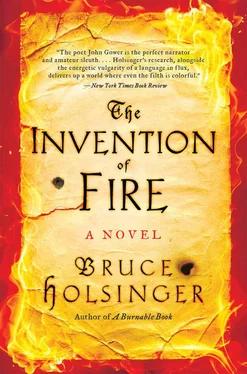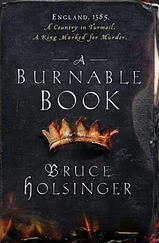Bruce Holsinger - The Invention of Fire
Здесь есть возможность читать онлайн «Bruce Holsinger - The Invention of Fire» — ознакомительный отрывок электронной книги совершенно бесплатно, а после прочтения отрывка купить полную версию. В некоторых случаях можно слушать аудио, скачать через торрент в формате fb2 и присутствует краткое содержание. Год выпуска: 2015, Издательство: HarperCollins, Жанр: Исторический детектив, на английском языке. Описание произведения, (предисловие) а так же отзывы посетителей доступны на портале библиотеки ЛибКат.
- Название:The Invention of Fire
- Автор:
- Издательство:HarperCollins
- Жанр:
- Год:2015
- ISBN:нет данных
- Рейтинг книги:3 / 5. Голосов: 1
-
Избранное:Добавить в избранное
- Отзывы:
-
Ваша оценка:
- 60
- 1
- 2
- 3
- 4
- 5
The Invention of Fire: краткое содержание, описание и аннотация
Предлагаем к чтению аннотацию, описание, краткое содержание или предисловие (зависит от того, что написал сам автор книги «The Invention of Fire»). Если вы не нашли необходимую информацию о книге — напишите в комментариях, мы постараемся отыскать её.
The Invention of Fire — читать онлайн ознакомительный отрывок
Ниже представлен текст книги, разбитый по страницам. Система сохранения места последней прочитанной страницы, позволяет с удобством читать онлайн бесплатно книгу «The Invention of Fire», без необходимости каждый раз заново искать на чём Вы остановились. Поставьте закладку, и сможете в любой момент перейти на страницу, на которой закончили чтение.
Интервал:
Закладка:
Stephen allowed it to surge within him once more, the allure and power of the gun. He blinked, pushing away the doubts, then issued his first command.
“You,” he said to the first. “We need iron, four of the arm bars to start. Bring them here, and I will show you what we are about. And you,” he said to the founders. “Copper and tin, eight parts and two.”
“Eight and two, Marsh? Are you-”
“Yes, eight and two, and you will soon know why. Get it bubbling now, will you?”
They obeyed. Next an apprentice approached him hesitantly, offering an apron of boiled leather, thick and long. Stephen donned it, then took up a hammer from the main smithy table and started giving the men their orders. Soon enough he felt himself slipping into his familiar role from Stone’s, as he moved among the forges and foundry, correcting a young hand here, providing an older one new direction there.
He took his own turns at the anvil and cauldron, making folds upon folds of iron, new foundings of bronze, sizzling blooms of metal in the flames, and when he came to the forges he found new strength in the shaping, the bending, the welding, the plunging and hiss. These weapons would be the greatest and most fearsome works of his life, he vowed, and soon he stood as some young demon amidst the fires and the men, commanding these monstrous births of snake and gun.
It was late the following day when Stephen finally called for a pause in their work, a rest well deserved by the metalmen under him. He had labored through much of that day and night before, pushing his workers to forge along with him, and now he wanted to reward them with strong beer or cider rather than the piss-weak ale served out by the Tower seneschals. Only the armorer himself could authorize that, he’d been told, so at the bell of five Stephen set down his hammer, took off his apron, and walked toward the structure housing Snell’s chambers. Though it was the first time he had visited the building since his initial visit to the Tower, he felt no fear as he climbed the narrow stairs, confident his request would be met with approval, even pleasure. For Stephen was, after all, the pride of the royal armory-and not only that, but the artist responsible for bringing a new breed of handgonnes into this coming age of war.
Why yes, he thought with a shivering pride as he climbed up the stairs, his soles a whisper on the rock. Despite the humble start at Stone’s, the confounding sentence at the wardmoot, and the unfortunate accident in the woods, look at me now, will you! I am Stephen Marsh, master gunsmith to His Royal Highness King Richard! I have ascended to this office with the speed of a hunting wolf, and who is to say I cannot climb ever higher? Even an appointment as chief armorer of the Tower wardrobe isn’t out of the question, albeit William Snell holds that position currently. Yet how long can he last given the vagaries of royal favor-especially once it’s known that a superior craftsman, a higher quality of mind, is making his guns for him, already leading the men of the armory in their needful work for the crown?
He had reached the darkened landing before Snell’s chamber. The door, he realized, was already slightly open. Must have that repaired , Snell had said during Stephen’s first visit to the Tower. The bad latch allowed a sliver of light to escape, along with the low murmurs of two conversing men. Snell had another visitor before him. Stephen would abide in the antechamber, he decided, as his matter was hardly urgent. The men of the armory could wait for their refreshment, even as they waited on their new captain. Soon enough, however, Stephen’s curiosity got the better of his judgment, and he stole softly forward, putting an ear to the crack.
“In any case I hope it all meets with your approval,” Snell was saying.
“My approval is the least of our worries,” said the other quietly. “It is the duke whose wants we must satisfy.”
Though Stephen could not see the visitor’s face it was apparent he was talking down to the armorer. The man’s voice was clipped and distinctive, with the confidence of a lord’s, and at first this deafened him to the content of their talk-though not for long.
“And you are familiar with his wants?”
“His Grace will no doubt be pleased,” the visitor said. “These devices are an ingenious bit of work, and he will enjoy this small adornment to his arsenal.”
“We can only hope so,” said Snell, sounding doubtful. “Burgundy’s artillery is the wonder of Christendom. One minor innovation will hardly buy us favor if it comes to war. Or so it seems to me.”
“Think of our gift as a token of fealty, then,” said the other man. “Yes, a few hundred of these feeble handgonnes crafted by your farrier will wilt in the glare of a thousand longbows. You have said so yourself, Snell. Yet it is the gesture that matters in such affairs.”
“I hope you are right, or all our efforts will vanish in our own smoke.”
“We are doing everything we can to guard against such an outcome.”
“Yes. Though I worry His Grace will prove changeable, not a man of his word.”
“You should read the chronicles. With the invasion Valois may well swallow Plantagenet like a hawk swallows a mouse. Yet King Charles is hardly William the Conqueror. He will not be tempted to flood our wild and primitive island with his dukes and counts. England will be ruled from abroad, of that we may be confident. And its domestic overseers will be men who have already proved themselves loyal to the winning side.” A heavy pause. “Men like us, my good William.”
Stephen heard the clap of palms on knees and the shuffle of feet, though in his fury at the insults he failed at first to register what these sounds signified. His handgonnes feeble ? His serpentine device a minor innovation ? His craft no better than that of a farrier, a mere maker of horseshoes? How dare these two slander his talents and craft in such a way?
Then he realized his peril. The men had risen too quickly. They were about to leave the room. Stephen was trapped in the antechamber, giving him no chance of making it down the stairs without detection. He had no choice but to squeeze himself into a niche in the walls not three feet from where they would pass on their way out. He made himself as small as possible.
“Very well, then,” said Snell as he came out the door to his chambers.
The visitor’s head was turned away, his hood already drawn up against the cold. No livery on his cloak or coat, though there was considerable wealth in his fine raiment.
“Exton rides in one week,” said the man in a low murmur. “Seven days, twenty men, one hundred serpents. Your gunsmith is up to the task?”
“I have no reason to doubt him. He is a proud fellow, but the Tower has a way of beating pride out of even the hardest men. And Marsh? He’s of the softer sort, I’m afraid.”
The men shared rough laughter as they descended the stairs. Then they were gone.
Chapter 33
As Beauchamp had requested, I reported to the keep immediately upon the return from Desurennes. He asked me not into his chambers but into the keep’s upper hall, a narrow though high-ceilinged room looking out distantly on a dimming sea at dusk. A servant brought me wine and a light meal, which I ate quickly by candlelight as I told him a portion of what I had learned at Desurennes-all but the most important detail.
“You are quite sure, Gower?” he said.
“I am, your lordship.”
“No other signs? No evidence of responsibility, nothing to suggest who might have done this to those poor villagers?”
“I am afraid not, my lord. The attackers came and went without leaving the barest of traces, it seems.”
Читать дальшеИнтервал:
Закладка:
Похожие книги на «The Invention of Fire»
Представляем Вашему вниманию похожие книги на «The Invention of Fire» списком для выбора. Мы отобрали схожую по названию и смыслу литературу в надежде предоставить читателям больше вариантов отыскать новые, интересные, ещё непрочитанные произведения.
Обсуждение, отзывы о книге «The Invention of Fire» и просто собственные мнения читателей. Оставьте ваши комментарии, напишите, что Вы думаете о произведении, его смысле или главных героях. Укажите что конкретно понравилось, а что нет, и почему Вы так считаете.












